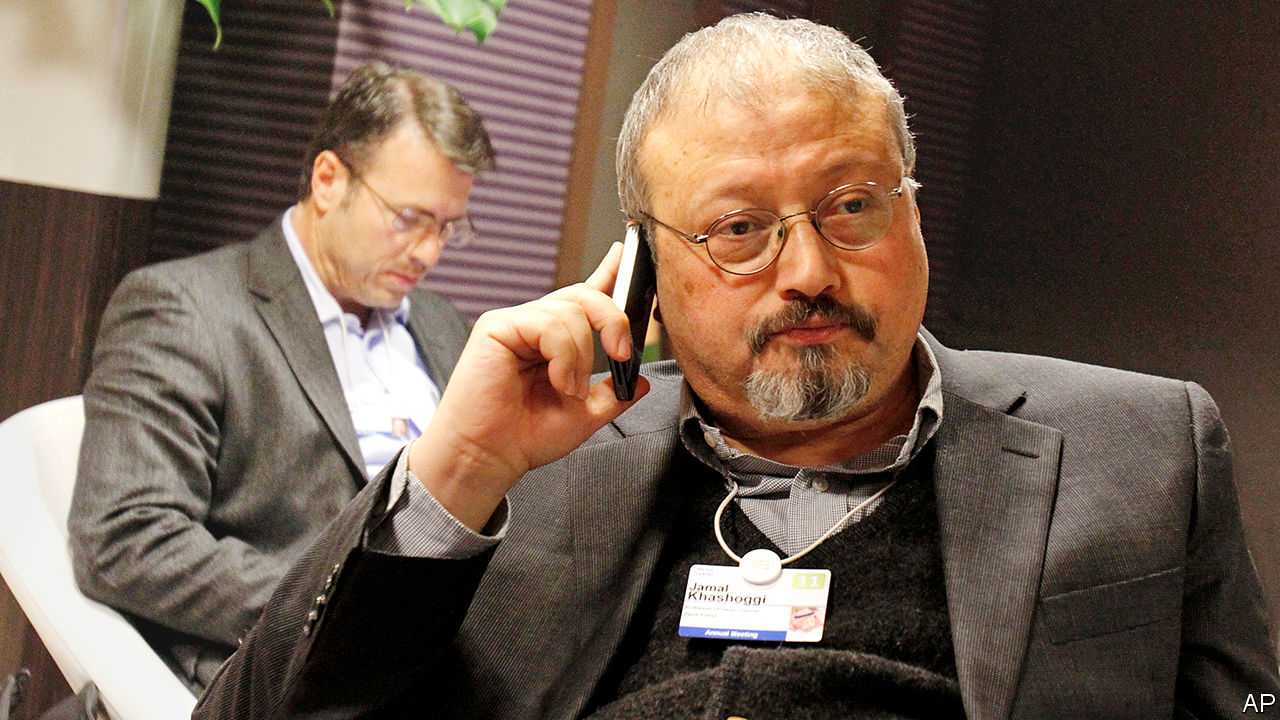
IT HAS been over a week since Jamal Khashoggi, a prominent Saudi journalist and government critic (pictured), walked into the Saudi consulate in Istanbul to get paperwork for a marriage. No one has seen him since. Turkish officials say that he was killed by a team of Saudi assassins, who dismembered his body, on orders from the top of the royal court (see article). The Saudis retort that Mr Khashoggi left the building of his own accord. If so, when? Are there witnesses or written records? Why is there no security-camera footage? And why did 15 Saudis fly in on private jets just before he disappeared, and leave shortly after? The Saudis must provide answers, or the world will assume the worst.
If it transpires that Mr Khashoggi has been killed, whether deliberately or in a botched kidnapping, it will strengthen the sense that Muhammad bin Salman, the Saudi crown prince and de facto ruler, is more of a rogue than a reformer. He has locked up thousands of activists. He detained a sitting prime minister of Lebanon, Saad Hariri, for two weeks in November. His long arm has already reached abroad. In March a women’s-rights campaigner, Loujain al-Hathloul, was detained in Abu Dhabi, whisked to Saudi Arabia and, later, thrown in jail. In September a Saudi satirist based in London claimed that he was beaten by goons who had been sent from Saudi Arabia.
Murdering a critic on foreign soil would be an escalation of a dismal trend. Unlike past Saudi royals, who allowed some debate and often sought to mediate between competing interests, Prince Muhammad rules as if only he has the answers. His brutish handling of even mild critics is overshadowing more admirable policies, which include curbing the religious police, letting women drive and encouraging them to work. As his regime starts to resemble an Arab nationalist dictatorship—socially liberal but centralised, paranoid and built on fear—his promise of a new, tolerant Saudi Arabia is receding.
Prince Muhammad’s autocratic tendencies have economic consequences, too. He aims, ambitiously, to wean the kingdom off oil. But investors are warned off by the capricious way he takes decisions. Last year he locked up and seized assets from hundreds of businessmen, officials and princes in an “anti-corruption” drive that lacked even a hint of due process. His effort to spur the private sector is, oddly, top-down. The planned stockmarket listing of part of Aramco, the state oil giant, suffered from Prince Muhammad’s micromanagement and has been postponed indefinitely. Other grandiose projects, such as NEOM, a futuristic city staffed by robots, seem ill-considered. But advisers dare not challenge the prince.
Some friendly nasiha
In countries like America, where Mr Khashoggi lived, the instinct has been to offer the prince weapons and support. Instead, the prince’s allies should make clear that he does not have a blank cheque—and that his rule would benefit from more openness. Mr Khashoggi, a former government adviser, often said that his criticism of the Saudi regime was nasiha, or friendly counsel. He did not consider himself a dissident and disliked the idea of regime change. “It’s just ridiculous,” he told The Economist in July. “I believe in the system—I just want a reformed system.” The Saudi regime should listen to its critics, not silence them.







